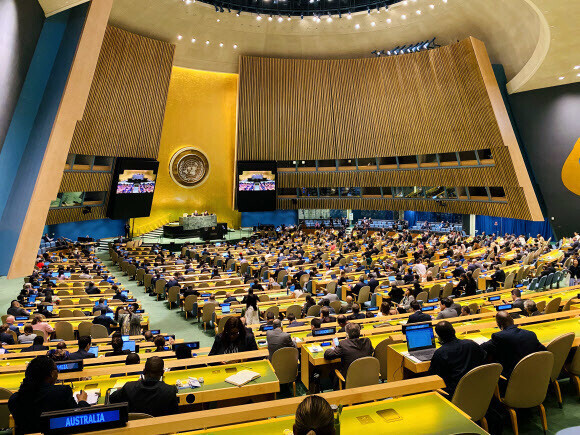hankyoreh
Links to other country sites 다른 나라 사이트 링크
Can S. Korea use UN Security Council seat to lead response to N. Korea’s nuclear program?

After South Korea’s election as a non-permanent member of the United Nations Security Council (UNSC) for the first time in 11 years, the Yoon Suk-yeol administration expressed hopes that this will lay the groundwork for Seoul to play a leading role in international discussions on matters such as the response to the North Korean nuclear program.
Presidential office spokesperson Lee Do-woon quoted Yoon on Wednesday as having called the election a “victory for global diplomacy.” In the administration’s assessment, the diplomatic strategy with Yoon’s emphasis on “values diplomacy” contributed to South Korea winning its seat as a non-permanent UNSC member.
In an election of non-permanent UNSC members for the 2024–25 term at the UN headquarters in New York at 10 am on Tuesday, South Korea was chosen with votes from 180 out of 192 participating member countries.
The UNSC is the only international organization with primary responsibility for maintaining international peace and security and with the authority to make binding decisions on matters such as economic sanctions against UN member nations. It consists of 15 members at any given time, including five permanent members (the US, China, Russia, the UK and France) and 10 non-permanent members.
The 10 non-permanent members are assigned by continent on a term-based system where five nations per year are switched out.
South Korea was elected as the only candidate from the Asia-Pacific group. The other countries elected to join as non-permanent members that day were Algeria, Sierra Leone, Slovenia and Guyana.
This is South Korea’s third time as a non-permanent UNSC member, after previous periods in 1996–97 and 2013–14.
During a briefing, Ministry of Foreign Affairs spokesperson Ahn Eun-ju said that through South Korea’s UNSC membership, the administration planned to lead discussions on peacekeeping activities and the promotion of peace; issues related to women, peace, and security; cyber security; and overcoming climate change.
In particular, the administration plans to speak out actively on a response to the North Korean nuclear and missile issues in the framework of the UNSC, where it previously had little voice.
“As a direct party to Korean Peninsula issues and a UNSC member, we expect that it will be possible for us to play a leading role in a response to the North Korean nuclear and missile issues,” said National Security Office First Deputy Director Kim Tae-hyo in a briefing.
But with UNSC permanent members China and Russia holding veto powers over discussions on North Korea, analysts predict that Seoul will have difficulty presenting any concrete additional measures.
Referring to the situation next year where South Korea, the US and Japan will all be UNSC members — the US as a permanent member and Japan as a non-permanent member for the 2023–24 term — Kim Tae-hyo predicted, “Plans for coordination could be strengthened substantially through linkages within the UNSC framework.”
He added that South Korea “appears likely to play a leading role in the process of ending the war in Ukraine and in the course of handling the postwar situation based on international norms.”
By Jang Ye-ji, staff reporter; Bae Ji-hyun, staff reporter
Please direct questions or comments to [english@hani.co.kr]

Editorial・opinion
![[Column] Tariffs on China: Trump was dumb, Biden dumber [Column] Tariffs on China: Trump was dumb, Biden dumber](https://flexible.img.hani.co.kr/flexible/normal/500/300/imgdb/original/2024/0520/191716191153918.jpg) [Column] Tariffs on China: Trump was dumb, Biden dumber
[Column] Tariffs on China: Trump was dumb, Biden dumber![[Column] What if Seoul took reunification by force off the table? [Column] What if Seoul took reunification by force off the table?](https://flexible.img.hani.co.kr/flexible/normal/500/300/imgdb/original/2024/0520/3017161928630494.jpg) [Column] What if Seoul took reunification by force off the table?
[Column] What if Seoul took reunification by force off the table?- [Editorial] Intensifying US-China rivalry means Seoul must address uncertainty with Beijing sooner than later
- [Column] When ‘fairness’ means hate and violence
- [Editorial] Yoon must stop abusing authority to shield himself from investigation
- [Column] US troop withdrawal from Korea could be the Acheson Line all over
- [Column] How to win back readers who’ve turned to YouTube for news
- [Column] Welcome to the president’s pity party
- [Editorial] Korea must respond firmly to Japan’s attempt to usurp Line
- [Editorial] Transfers of prosecutors investigating Korea’s first lady send chilling message
Most viewed articles
- 1Xi, Putin ‘oppose acts of military intimidation’ against N. Korea by US in joint statement
- 2Kim Jong-un wanted to meet with residents of shelled Yeonpyeong Island in South, Moon recalls in mem
- 3To weigh costs and benefits, Korea must stop treating US troop presence as a sacred cow
- 4[Column] What if Seoul took reunification by force off the table?
- 5Berlin mayor hints at tearing down ‘comfort women’ memorial in city
- 6[Column] Tariffs on China: Trump was dumb, Biden dumber
- 7[Editorial] Transfers of prosecutors investigating Korea’s first lady send chilling message
- 8[Exclusive] Truth commission to seek additional murder charges for figures behind 1980 Gwangju massa
- 9Naver’s union calls for action from government over possible Japanese buyout of Line
- 10[Column] US troop withdrawal from Korea could be the Acheson Line all over